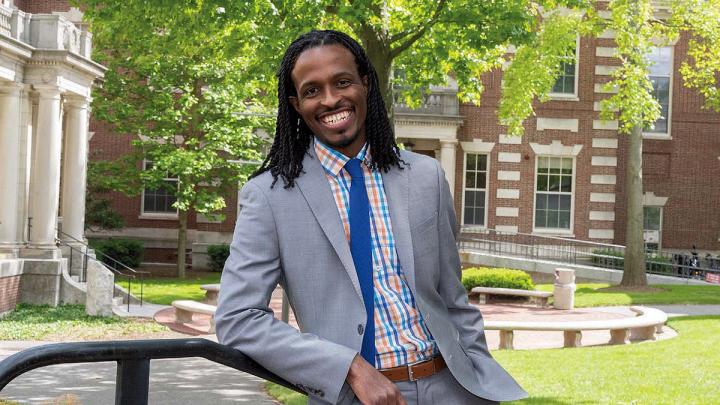As a classics concentrator and classical pianist, Tracy “Ty” Moore II ’06 still found time as an undergraduate to perfect the “Flying Death Necklace.” The stunt, performed in the Harvard South Asian Association’s Ghungroo show, required him to stand on stage as a friend ran toward him, jumped high into the air, propelled forward by his hips, and thrust his feet at Moore’s head.
“As his feet wrapped around my neck, I grabbed his ankles with my hands and almost immediately started spinning,” he recalled, “and so, he is effectively flying [parallel to the ground] with both his arms flung out in the air. It is like I’m wearing a human necklace.” The act was nerve-wracking, yet they performed it flawlessly in all four shows—“a little surprising,” he says, considering some pretty rough rehearsals.
He brings such energetic openness to different experiences and versatility to his role as the 2023-24 Harvard Alumni Association (HAA) president, emphasizing one main message to alumni: “Be human.” “Quite frankly,” he says, “our society has fallen into the trap of dehumanizing each other, and there’s this rampant unwillingness to truly connect on a human level. People are no longer willing to have conversations with others who have different opinions,” he adds. “I see this as a huge opportunity for our alums, and people in general, to get back to the place where we are able to talk to one another as humans, regardless of background, experiences, and views.”
Moore points to spirited Monday night College symposia hosted by the Harvard Black Men’s Forum (he ultimately became president). Despite its name, the group was not monolithic, drawing students from across disciplines; political ideologies; and socioeconomic, racial, and ethnic backgrounds for discussions that “were so interesting because you learned not only more about the topic and the other person,” he says, “but a lot more about yourself because you could engage in thoughtful dialogues and disagreements—which actually were encouraged. This all strengthened a person’s ability to think and defend positions, and to better articulate their perspective and rationale.”
These meetings were also the first time Moore, an African American, felt deeply connected to a larger black community. Growing up in a lower-middle-class community in Cincinnati, Ohio, he was active in his family’s church (his father was pastor) and excelled in academics. He studied Latin, trained to become a concert pianist, and won three national Certamen championships (and was inducted into the National Certamen Hall of Fame in 2001). In seventh grade, he moved from a public to a private school, where he was among the small group of minority students, he says, “but outside of my family and church, I didn’t interact much with black people. So Harvard was the first time I was able to connect with people who looked like me and were also highly motivated, intellectually curious, and extremely passionate about their interests.”
Moore served as First Class Marshal his senior year and, since graduation, has worked as an impact-driven leader, executive coach, and serial entrepreneur. In 2012, he joined College friend Jason Young ’04 in founding The Hidden Genius Project, a national nonprofit headquartered in Oakland, California, that “trains and mentors black male youth in technology creation, entrepreneurship, and leadership skills to transform their lives and communities,” he says. Moore is now co-founder of the executive coaching and leadership development firm VeraVis. It serves both nonprofits and business organizations, helping them develop “more inspiring, high-performing cultures that people crave.”
This work informs Moore’s contributions as HAA president, too, as he continues to drive engagement and build community among the multifarious alumni. That includes planning a dynamic spring Alumni Day, communicating general alumni interests and concerns to the University, further developing technology and data to learn from and connect graduates, and helping to introduce alumni to both the HAA’s new executive director, Sarah Karmon, and the University’s new president, Claudine Gay. “The HAA is a global, diverse, vibrant community of more than 400,000 alums who are all human beings, creating this beautiful tapestry of life stories and lessons learned,” he says. “I’ve found a lot of value in simply engaging with my fellow alums in conversations, which has broadened my understanding of humanity. To the extent that I can impact this community in meaningful ways, I’m all for it.”








